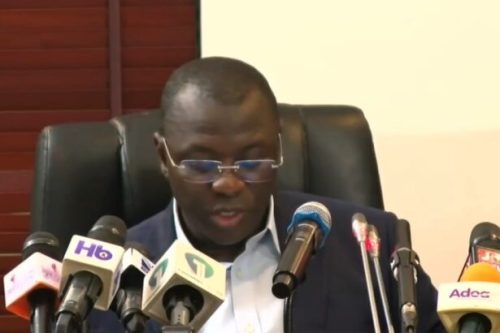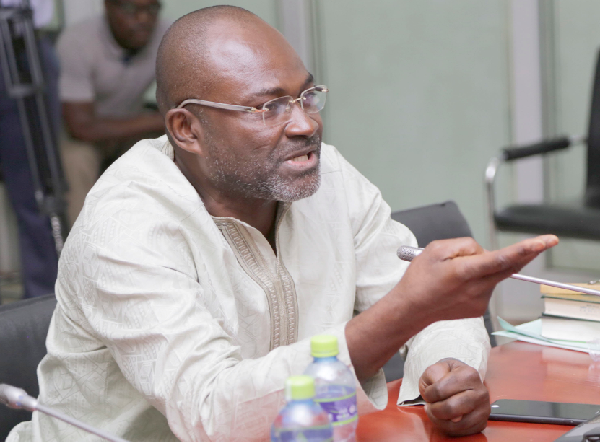
The Minority in Parliament has officially responded to the 2025 Budget Statement and Economic Policy of the Mahama Administration, which was presented by Finance Minister Dr. Cassiel Ato Forson on March 11.
On March 13, the Minority, represented by Dr. Mohammed Amin Adam, delivered their critique of the 2025 Budget. They accused Dr. Forson of manipulating figures to portray a bleak picture of the economy handed over to the current administration.
Read the full statement below
:NPP Minority Holds Press Conference on 2025 Budget Statement at Parliament House
1. Acknowledgment of Support
The Minority expressed gratitude to the media for their continued support in conveying their message to the Ghanaian public and for helping deepen the country’s democratic process.
2. Pre-Budget Concerns
The Minority recalled that prior to the 2025 Budget presentation, they had warned about the government’s plans to manipulate fiscal data to falsely claim that the previous NPP administration had poorly managed the economy. This strategy, they argued, was part of a broader narrative propagated by President Mahama and repeated at the National Economic Dialogue.
3. Confirmation of Manipulation
The Minority claimed that the 2025 Budget was the tool used to substantiate the government’s unfounded claims by presenting manipulated data. They believed their earlier warnings had been vindicated, confirming that the Finance Minister had executed this strategy.
4. Concerns Over Fiscal Deficit and Data Credibility
The government, through the 2025 Budget, has reported a fiscal deficit of 7.6% of GDP and a primary deficit of 3.6% of GDP. The Minority argued that these figures suggest that the previous NPP administration mismanaged the fiscal situation, according to the intentions of the NDC government. However, they emphasized that an economy with strong revenue performance and proper expenditure management, as reflected in the budget data, should not result in such high fiscal deficits. This, they claimed, raises serious doubts about the credibility of the fiscal data presented in the 2025 Budget.
5. Agreement with IMF on Fiscal Monitoring
Prior to the start of the IMF program in 2023, the government and the IMF agreed to set a fiscal anchor to monitor the program based on fiscal balances, including the primary balance and overall fiscal balance. The goal was to have a real-time view of arrears accumulation, so commitments that had passed through the GIFMIS system and were awaiting payment were ring-fenced. These were categorized as outstanding expenditure claims. The Minority highlighted that this approach was used in the 2022 budget and agreed upon with the IMF to monitor the evolution of these claims and their net build-up. Given Ghana’s development needs, it was understood that new commitments would arise, but the aim was to keep the build-up of arrears almost neutral to prevent harm to the economy. Expenditure Claims and Arrears Clearance Strategy
The Arrears Clearance Strategy, prepared by the Ministry of Finance and submitted to the IMF in 2023, highlighted that expenditure claims described as arrears amounted to GHs47.5 billion. After an aging analysis, it was found that some of these payments had been outstanding since 2012/2013. The Minority emphasized that while some arrears may have accumulated between 2022 and 2024 due to liquidity issues, the figures in the 2025 Budget should have been properly verified or audited before inclusion.
7. Incorrect Inclusion of Expenditure Claims
The Minority criticized the Finance Minister for including GHs49.2 billion in expenditure claims without proper verification or audit. They argued that inserting these claims into the fiscal framework as if they were generated in 2024 is misleading and outside the scope of the fiscal framework. This, they claimed, demonstrates a lack of understanding of the fiscal system and undermines the credibility of the budget.
8. Fiscal Framework and Audit of Claims
The Minority emphasized that the fiscal framework should focus solely on central government operations. They pointed out that claims not properly audited can introduce elements from the general government, which distorts the fiscal data. An example given was the Controller and Accountant General’s final accounts, which are based on General Government Accounting. If these figures are used directly in the fiscal framework, they can result in misreporting. The Minority argued that proper verification and auditing of numbers is necessary to accurately reflect central government expenditures.
9. Concerns About Using Unverified Data
The Minority criticized the Finance Minister for presenting fiscal deficit and primary deficit figures based on unverified claims. They argued that using unaudited data in the budget undermines its credibility, as unverified figures should not be used in important national documents. The Minority further stressed that such actions create a credibility crisis, as they reflect poorly on the integrity of the budget’s conclusions.
10. IMF Guidelines and Technical Discrepancies
The Minority pointed out that the technical staff at the Ministry of Finance had successfully overseen three IMF reviews without needing to compile claims from multiple years. The IMF’s Technical Memorandum clearly defines how the primary balance is to be calculated, specifying that it should be cumulative from the beginning of the fiscal year and measured according to certain criteria. The Minority noted that the “unreleased claims” of GHs49.2 billion do not fit this definition and questioned the Finance Minister’s methodology.
11. Inconsistency in the Use of Claims
The Minority questioned how the government derived fiscal balances without fully adhering to the IMF methodology. They pointed out that the claims in question were multi-year claims and not related to statutory funds or energy payments, which contradicts the IMF guidelines. The Minority demanded an explanation from the government about how these fiscal balances were calculated, stressing that without following the agreed methodology, the fiscal data is unreliable.
The Minority views many of the claims in the 2025 Budget as misleading or false. They argue that the Finance Minister’s presentation of the fiscal deficit and primary deficit figures, based on unverified and erroneous data, is a deliberate attempt to distort the truth and tarnish the record of the previous government.









